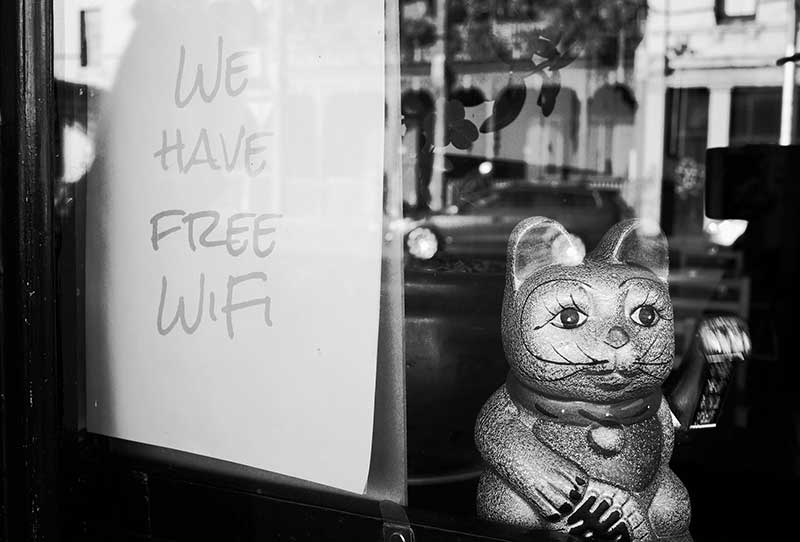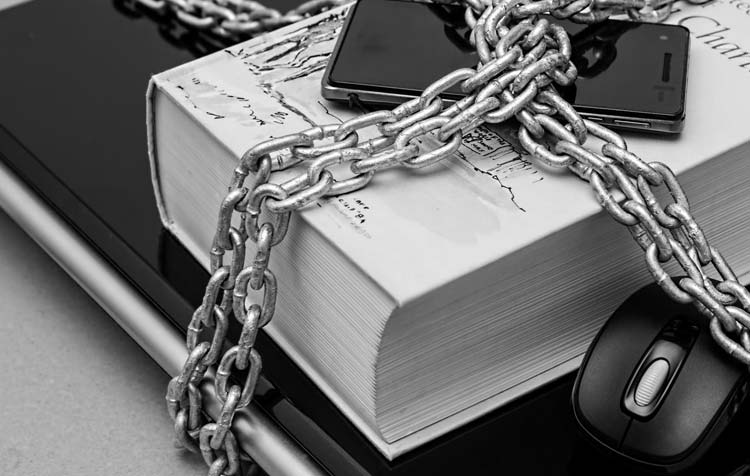How to avoid and prevent identity theft? For a long time I believed that only others were victims of Internet scammers anyway. Until I got hacked myself with my digital currency account. After many discussions with the police and "good hackers", I am now glad that it didn't get any worse: identity theft would also have been relatively uncomplicated because I didn't protect my data sufficiently on the Internet.
In this article, I want to show you what you can do better than me when it comes to protecting yourself from hackers and identity theft right from the start. Let's go!
In advance a short Overview about the tips from this post for you:
- Do not send pictures of your identity card to strangers
- Use strong, different passwords
- Use a separate email address for important accounts
- Switch to 2-factor authentication
- Avoid using public wifi networks
- Ignore mails from unknown senders
- Always log off!
- Think first, then click!
- Check your accounts regularly
- Report phishing emails and data misuse
Notice: The article has little to do with sustainability and environmental protection. Nevertheless, it is important to me to draw attention to this problem and also to protect others sustainably from hacker attacks and identity theft.
10 tips against identity theft on the Internet
Accounts and the most personal data could be misused. Credit card or social security fraud is also possible. Last but not least, third parties could use a few pieces of data, such as First names, family names and date of birth your identity and commit fraud. As a result, for example, countless orders may be placed on account or fee-based contracts may be concluded in your name. A lot of subjunctive, of course! But such chain reactions can be difficult to set up and - depending on the extent - also difficult to endure psychologically.
Here are 10 tips to protect against identity theft and other scams online that you should use aside from your anti-virus software on your devices right now!
1. do not send pictures of your identity card to strangers
Nowadays, you rarely have to provide a scanned copy of your own ID to prove your identity - there are usually other options. If a copy of your ID is required, you should first provide the following questionwhy this should be necessary at all. If everything is believable, then you should at least send encrypted. You can also add a watermark with Photoshop to at least exclude the direct distribution and use of the ID card. Of course, the data is still usable - both in trustworthy hands, but also in criminal hands.
2. use strong, different passwords

Want to avoid identity theft? Then don't use simple passwords like "1234" to access your accounts - and make sure you never use the exact same password. Also, make sure that you don't use the Keep passwords secret and that you do not constantly forget and have to renew them. Nevertheless, it is advisable to change your password at regular intervals. This way you make it as difficult as possible for hackers to crack more than ONE access to your personal data and steal your identity.
3. use a different email address for important accounts
Over time, you enter your email address on quite a few websites and in an incredible number of forms! The danger that it (also in combination with a password) gets into foreign hands increases. That's why I advise you to do this, for particularly important accounts to create a separate mail address, which was otherwise hardly or not at all entered on the Internet or can be found.
Tip: Do you actually know how to surfing the internet as sustainably as possible can? Find out in the linked article!
4. set up the TWO FACTOR AUTHENTICATION
With 2-factor authentication (often called 2FA), you protect your access in two ways. On the one hand, you have a username and password, and on the other hand, you have to enter an additional code, which you can enter for example retrieve via SMS or in an authenticator app can. This means that two independent devices are used. A hacker would therefore have to be in possession of your computer and your smartphone to gain access to your accounts. So set up 2FA on all your really important accounts to prevent identity theft and other criminal activities of Internet fraudsters.
Notice: By the way, I was hacked despite 2-factor authentication! So the protection is not an absolute guarantee - yet it increases the security of your data on the Internet immensely!
5. avoid the use of public wifi networks

You don't have full control over public computers and Wi-Fi hotspots. There are potential threats to the security of your personal data lurking everywhere. That's why you should always try to with your mobile data and VPN (encrypted data traffic). It is also best to surf in incognito mode or private mode, which is basically offered by all modern browsers.
6. ignore mails from unknown senders
In your mailbox there is one or the other mail that means absolutely nothing to you and whose sender you don't know? Then ignore and delete them - and then in any case refrain from using links or attachments to open. Also, always take a look at the sending email and its extension.
7. always log off!
Whether at home or on public computers: log out of your accounts and ideally, never save your access data in your browser either. Otherwise, you could make it easy for scammers to get your personal information and steal your identity.
Tip: For example, when you go to the print and copy store, make sure that you delete your PDF files from the PDF reader's history. Especially if you have printed highly sensitive data (e.g. bank statements or tax data), this hint can be crucial for your data security!
8. think first, then click!
I would still say after the hacker attack that I have always been pretty careful and questioned my actions on the Internet: but apparently I was not yet suspicious enough. If you want to prevent identity theft and avoid any form of Internet fraud, you should anywhere you enter or disclose sensitive data, think first and then click!
Tip: Especially for money transactions, check all payment data (especially the recipient) before you confirm and send it!
9. check your accounts regularly

The longer your data is circulating on the Internet and the more of your data is added, the more likely you are to be hacked and even have your identity stolen. To avoid fraud and the resulting consequential damage, you should protect your accesses with (especially email account, bank account, etc.) regularly and also adjust the access data from time to time if necessary. Also check sites like haveibeenpowned.com whether your e-mail address and corresponding passwords have fallen into unauthorized hands in the event of a data leak! With my old, private e-mail address, for example, this happened six times without me knowing about it. With each time, of course, the probability of being hacked at some point increased.
10. report pishing emails and data abuse
If one of your accounts has been hacked or your data has been misused, you should directly contact a File a criminal complaint with the police and also report the incident to the company involved. If necessary, as a victim of bank fraud, let yourself also be included in the Database at Schufa to prevent further misuse of your data.
It is important to curb Internet fraud in the future and to make it as difficult as possible for identity thieves. By informing other people about the dangers that may even threaten their existence, you are making a decisive contribution!
Avoid identity theft - Take the danger seriously!
I even have the feeling that I took the danger of a hacker attack seriously. Nevertheless, it worked. Not least because my e-mail address fell into the hands of criminal hackers during a data leak a few years ago. Even though the damage was already extreme for me, I was able to deal with the shock relatively quickly. But I also know that Internet fraudsters can destroy entire livelihoods through the carelessness and gullibility of users.
That's why I hope I've been able to give you the tips you need to avoid identity theft and protect your personal information online for good! Do you have any questions, suggestions or your own experiences with identity theft that you would like to share? Then feel free to write me a comment!
Stay safe,

PS: Feel free to keep checking out the blog! Learn for example how sustainable web design works! Have fun!





